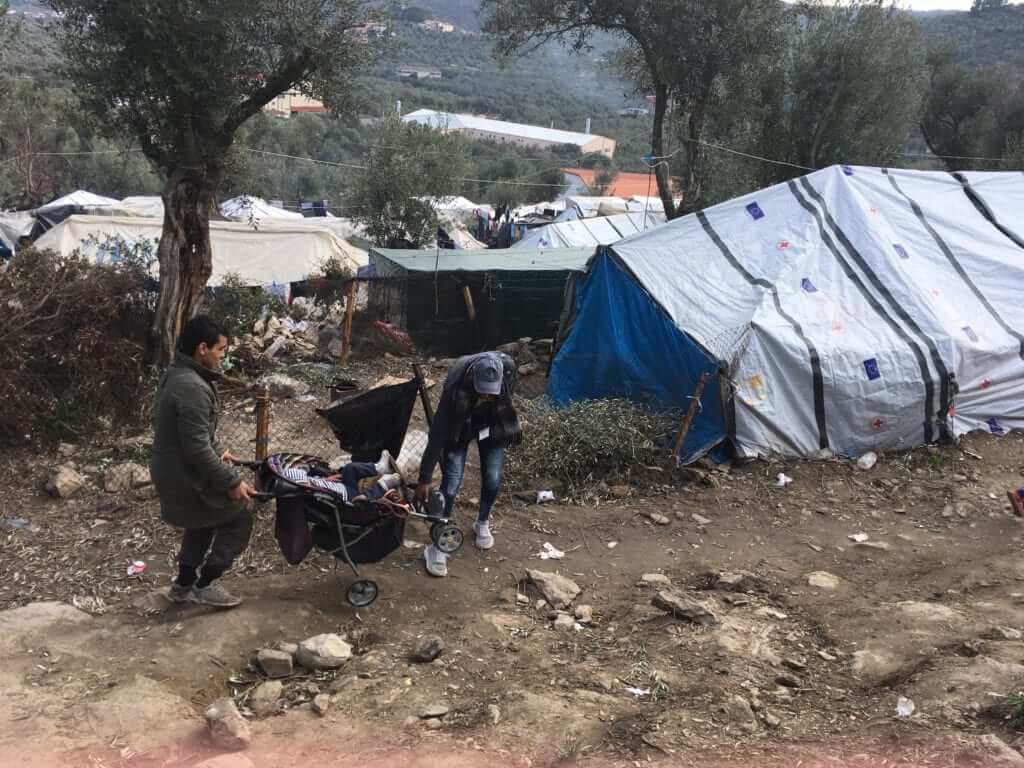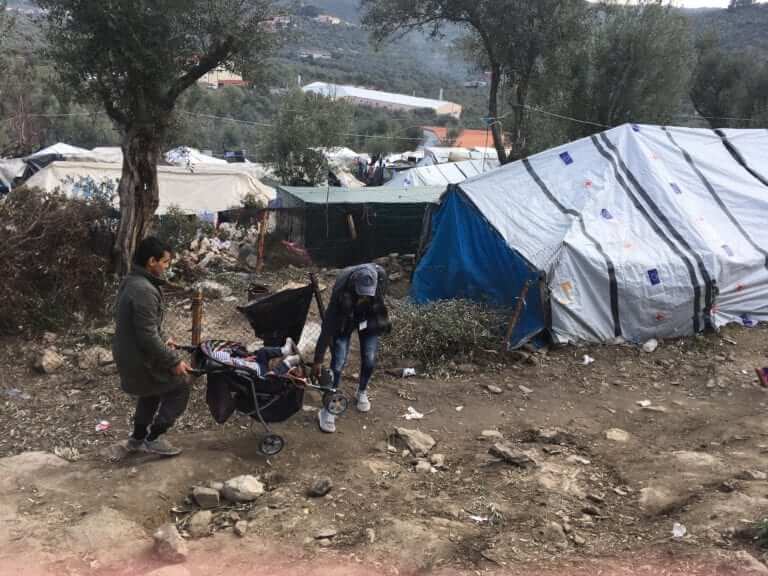– An account by Monowara Gani, CEO of Doctors Worldwide
“3 pairs of socks. That is all that he wore over his frozen and extremely painful feet. The open toed sandals provided no relief from the harsh cold weather. He hasn’t eaten for 2 days and his body constantly aches from the freezing grounds of the olive groves – where he sleeps. No respite, except for a brief moment as he closes his eyes to rest his fatigued body on the wooden pallet within the make-shift clinic. With his health deteriorating and eyes filled with despair, it is not medication that he seeks, but a witness to his suffering. As he relays his account to the kind doctor, she looks at him with a sad expression and says: ‘I am sorry. I understand’. He sighs deeply, pauses for a few moments and with empty downcast eyes, he says a heartfelt ‘thank you’ and leaves.”
The above case is one of many clinical encounters we experienced of desperate people looking for relief and hope beyond medical needs within Moria camp on the island of Lesbos, Greece. Moria camp was designed to house only 3,000 refugees and originally serving as a correctional facility, it now houses over 20,000 refugees and unaccompanied children who currently live in sub-humane, dangerous and appalling conditions spilling out into the surrounding olive groves. The 2015 early arrivals are the fortunate ones who take shelter within pallet boxes or the limited available spaces indoors. Most however, are living in tents designed for the summer weather with little or no access to heating during the freezing winter months – save the dangerous fires they have no choice to make [and the many cases of carbon monoxide poisoning]. Whilst there are provisions for 3 basic meals provided daily by the Greek government, people queue for hours each time with fights breaking out regularly and meals running out leaving thousands to fend for themselves. Most are too tired or weak to queue.
“…Grown women and children are forced to wear nappies…”
Access to the limited washing facilities and toilets is precarious particularly at night due to the pitch-black darkness and fear of attacks and sexual violence. One of the interpreters at the clinic we were in [a refugee himself who takes respite in helping others], spoke about his constant anxiety and fear of going to the bathroom after sunset, especially as he was previously attacked. Grown women and children are forced to wear nappies to avoid the nightly trips to the toilet – attending in group force is a risk not worth taking.
With local services at breaking point and the handful of NGOs working tirelessly around the clock with little autonomy or resources to change the conditions, we witnessed a relentless flow of patients each with their own horror story, coming into the tiny, cabin-like clinic with its makeshift outdoor cage [serving as additional space for consultations]. Hundreds attend this clinic daily, most queuing for hours and making a choice that no parent or human should ever have to make for themselves or their children i.e. queuing for food rations to alleviate hunger, or queuing at the clinic for medical help. Sadly, an empty stomach and lack of nutrients only serves to exacerbate poor health, adding to the vicious cycle of hunger and its impact on recovery.
“…making a choice that no parent should ever have to make for their children…”
Whilst sitting in on another medical consultation, an NGO worker relayed the case of a desperate husband who brought his wife to be seen with no apparent physical health needs. His desperation soon became clear and of great concern to the doctor attending not only because his wife was suicidal, but that she was intent on taking the lives of her children in order to end their suffering [despite loving them very much].
As an aunty to an amazing niece and nephew of a similar age, my heart could not bear to contemplate this situation happening to them. The death of any child is a great loss to humanity, to our future. But that death bears a greater and more disturbing darkness when it is at the hands of a parent who sees no other choice or way out. Indeed it is a shameful stain on humanity when people are driven to such tragic means – especially on the bright door steps of Europe where we bask in our proud history of charitable giving and excellent services afforded to those in crisis or need.
“…Children are going missing & living alone in the olive groves…”
With virtually zero capacity to cater for the mental health needs at Moria camp [save one charity with an oversubscribed and closed waiting list], it is only a matter of time before the situation in Moria camp explodes into something more sinister. People are barely managing let alone coping especially in this highly tensed, highly pressured and relentless environment. Already the most vulnerable – such as women and children – fear for their lives on a daily basis due to sexual violence and attacks. Children are going missing, with unaccompanied minors living in the olive groves alone and without a parent or guardian to tend to their emotional and physical needs – medical, shelter or otherwise. Yet the international outcry has been muted.
 A father struggling to carry his child in a pushchair down the steep hillsides of the olive grove. A passerby came to his aid.
A father struggling to carry his child in a pushchair down the steep hillsides of the olive grove. A passerby came to his aid.
On our last day in Moria camp, we left with one case that brings only the tidings of nightmares. As seasoned humanitarian workers, we come across cases and situations that continue to disturb the very core of our being. But this one case will never leave me. Not because it was new or that it does not happen elsewhere in the world. But because it was completely, utterly and absolutely solvable.
It was the case of a young unaccompanied minor, a boy living in the Olive Groves who was raped and later found by the NGOs and taken to the only available place – an over-capacity warehouse-like space where vulnerable children stay. Whilst the young boy was hanging around outside the walls of the make-shift clinic we were fortified within [there was no where else for the child to go]. The NGO worker accompanying us said:
‘He has cigarette burns and bruises, he is still being abused, most likely by other children or the same perpetrators, and nobody can do anything about it. Not until the situation changes. Not until the eyes of the world look toward Moria camp’.
The main market area within Moria camp surrounded by box-like structures where people live and try to sell goods
Help raise awareness of the dire refugee situation in Lesbos and the surrounding islands by sharing this article. Support and donate to Doctors Worldwide so that together we can continue to provide a vital lifeline for the refugees of Lesbos.
Save a Life. Change a Life.


